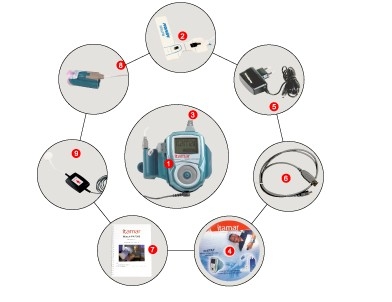
Business American hospital companies Bigger and better
商業(yè) 美國醫(yī)療公司 整合之潮亦其壯大之勢
America's big hospital groups will continue to gobble up competitors
美國大型醫(yī)療集團將繼續(xù)吞并小號醫(yī)療公司
HOSTILE takeovers are never polite.
財大氣粗的收購商的字典里沒有客氣二字。
One fight in America, however, has become particularly ugly.
然而,美國的一次收購事件卻成為了一則丑聞戰(zhàn)。
In December a huge stockmarket-traded hospital company, Community Health Systems, announced that it wanted to buy another, Tenet Healthcare, for $3.3 billion.
大型上市公司社區(qū)保健醫(yī)院(CYH)在十二月宣布,它想再收購一家公司——以22億美元收購泰尼特保健(TNH)。
The bid soon became a brawl.
此次收購出價迅速演變成一場爭奪戰(zhàn)。
In the saga's most recent chapter, Tenet filed a lawsuit accusing Community of overbilling government and private health-insurance schemes.
戰(zhàn)斗打了好幾個回合,最近一次,泰尼特提起了訴訟,控告社區(qū)保健醫(yī)院過分干預(yù)政府和個人的醫(yī)療保險計劃。
Community denies this and, as The Economist went to press, was due to present a more detailed rebuttal.
為了給出更有利的回擊,本刊刊登時,社區(qū)保健醫(yī)院對上述指控矢口否認。
Although this bid battle has become unusually rancorous, it is in line with a broader trend of consolidation in the huge but fragmented business of providing hospital care.
盡管此次出價戰(zhàn)不同于一般的敵意收購,但它更傾向于是一種醫(yī)療業(yè)整合趨勢——將大而散的美國醫(yī)院整合起來。
In 2009 America's hospitals soaked up one-third of all national health-care spending, or $759 billion, roughly equal to the entire GDP of the Netherlands.
2009年,美國醫(yī)院就吸金7590億美元,占整個國家醫(yī)療保健費用的三分之一,大約相當于荷蘭整整一年的國內(nèi)生產(chǎn)總值。
In the long term an ageing population will produce more invalids and thus more business.
從長遠來看,人口老齡化將產(chǎn)生更多醫(yī)療需求,從而帶動醫(yī)療業(yè)的發(fā)展。
In 2014 the "Obamacare" health reforms will bring 32m newly insured patients.
到2014年,奧巴馬醫(yī)療改革方案將使醫(yī)保人數(shù)新增3200萬。
The less good news is that the health reforms also bring new regulations and intense pressure to contain costs. This is strengthening the argument for consolidation among hospital operators.
不過壞消息是,醫(yī)療改革方案所產(chǎn)生的新的規(guī)章制度讓政府不得不縮緊褲腰帶來應(yīng)付節(jié)省開支帶來的壓力。
Mergers are nothing new in the industry.
在醫(yī)療行業(yè)中合并不過是老生常談。
In 1979 only 31% of America's hospitals were part of a larger hospital system.
1979年,僅有31%的美國醫(yī)院屬于大型醫(yī)院。
By 2001 more than half were.
到2001年,該比例超過了50%。
The rationale for joining a larger chain is simple. It means better access to capital for renovation and expansion, better management and—most important—more clout when negotiating treatment prices with health insurers.
加入大型醫(yī)院并購圈的原因再簡單不過——為了得到更新設(shè)備、引進設(shè)備、開發(fā)設(shè)備的資金,為了加強管理,最重要的是,為了在醫(yī)療保險金上與醫(yī)療保險公司談判時擁有強有力的發(fā)言權(quán)。
Now, the health reforms are piling on the pressure to merge.
如今,醫(yī)療改革給合并上的壓力再加一碼。
Obamacare requires hospitals to invest heavily in technology, even as the government cuts payments for treatments.
奧巴馬方案一方面要求醫(yī)院在技術(shù)方面下重金,另一方面卻不管政府在醫(yī)療費用上日銷月鑠。
Hospitals will increasingly have to demonstrate the quality of their services.
醫(yī)院將越來越能顯示出政府公共事業(yè)機構(gòu)的建設(shè)質(zhì)量。
Small hospitals may struggle to meet such demands; bigger groups will be better equipped. Besides, now is a good time to be doing deals, says Gary Lieberman of Wells Fargo.
小醫(yī)院可能會努力滿足需求,大公司將會盡力提高醫(yī)療條件,此外,富國銀行的蓋里?利伯曼還說,現(xiàn)在正是兼并交涉的大好時機。
Credit markets have offered favourable terms to hospital groups raising money.
信用市場為醫(yī)療集團集資提供的有利的條件。
And thanks to the downturn there has been ample supply of not-for-profit hospitals for sale.
由于經(jīng)濟危機,有相當數(shù)量的非營利性醫(yī)院待售。
Community's bid for Tenet is the biggest deal now in the works.The combined companies would have annual revenues of $22 billion, second only to HCA, which last month raised $3.79 billion in an initial public offering (IPO).
社區(qū)保健醫(yī)院對泰尼特保健的收購是正在醞釀中的一筆最大的買賣:并購后的公司將產(chǎn)生220億美元的年收入,僅次于美國醫(yī)院社團(上月首次公開募股籌資37.9億美元)。
But plenty of smaller deals are going on.
除此之外,還有大量的小型并購正在進行中。
Vanguard Health Systems, which this month filed for an IPO, has bought hospitals in Detroit, Chicago and Arizona in the past year. HCA seems likely to use at least some of its IPO cash to make more acquisitions.
去年一年中,先鋒衛(wèi)生系統(tǒng)公司它在底特律、芝加哥、亞利桑那州均收購了醫(yī)院,它于上月申請首次公開募股,并很有可能用一部分或者全部的募股資金來收購更多的醫(yī)院。
Big hospital operators must still grapple with Obamacare's new requirements.
大型醫(yī)院還要繼續(xù)應(yīng)對奧巴馬方案的新要求。
And in some cases, growing larger brings its own challenges.
在某些情況下,擴大規(guī)模也就給自己帶來了相應(yīng)的麻煩。
Vicki Bryan of Gimme Credit, a bond-research firm, worries that Vanguard's shopping spree (and dividends to its shareholders) have left it with excessive borrowings.
債券研究公司吉美信貸的維基.布萊恩為此感到擔憂:一是先鋒衛(wèi)生系統(tǒng)公司的瘋狂購物節(jié)已經(jīng)讓他們欠下負債累累,
Another worry is that although there are many benefits to being big, realising them takes time.
二是盡管擴張企業(yè)規(guī)模能帶來可觀的收益,但想讓錢掉進自己的口袋尚需時日。
HCA's recently improved earnings, Ms Bryan contends, are largely due to changes in accounting and billing models.
布萊恩表示,近日美國醫(yī)院社團(HCA)收入之所以增加,主要是得益于賬務(wù)結(jié)算模式的改進。
Tenet says Community has boosted revenue by keeping patients in hospital unnecessarily; Community denies this vehemently.
巧婦難為無米之炊,泰尼特保健覺得,社區(qū)保健醫(yī)院何苦要通過增加病人在醫(yī)院所耗的時日來增加自身收入呢。社區(qū)保健醫(yī)院對此大呼自己是冤大頭。
Nonetheless, the hospital-merger wave still has far to go.
不過,醫(yī)院兼并浪潮才剛剛開始。
HCA, despite being the industry's leader, controls less than 5% of the market.
雖然美國醫(yī)院社團是醫(yī)療業(yè)的領(lǐng)頭羊,市場掌控率卻不到5%。
There are many more deals to come, the only question is how quickly.
更多的兼并事件即將到來,唯一的問題就是兼并商們?nèi)绾螌⑹虑樘幚淼酶拥眯膽?yīng)手。



